|
|
|
Sort Order |
|
|
|
Items / Page
|
|
|
|
|
|
|
| Srl | Item |
| 1 |
ID:
167428
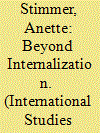

|
|
|
|
|
| Summary/Abstract |
Norm scholars tend to treat norm contestation and acceptance as binary categories. This obscures variation in how much states agree over how to apply international law to specific situations. I distinguish between disagreements over norm frames (justifications) and claims (actions) and thus highlight four different outcomes of norm contestation. These differ in their effects on the clarity and strength of the contested norms, as well as on subsequent debate over them. Specifically, I argue that frame agreement limits the range of actions that actors can legitimately pursue and thus involves norm recognition. In contrast, if states only agree on the action that should be taken, but not on the norm that applies, we see norm neglect. Both outcomes structure subsequent debates, but norm neglect is the more volatile outcome: because of the lack of normative commitment, states can justify the agreed-upon action as exceptional compromise and later revert back to a norm impasse (frame and claim disagreement). However, the joint action may also trigger socialization processes that lead to agreement on both frames and claims—that is, produce norm clarification. Hence, this typology builds a bridge between understandings of contestation as a never-ending debate and as an avenue toward agreement; it helps improve our understanding of compliance mechanisms and of contestation.
|
|
|
|
|
|
|
|
|
|
|
|
|
|
|
|
| 2 |
ID:
167441


|
|
|
|
|
| Summary/Abstract |
A number of international relations scholars charge that the field suffers from academic religiosity: factional divisions along theoretical lines that limit research potential and create unnecessary bias against certain approaches. I explore this view of the field by applying a topic-modeling algorithm to a corpus of article abstracts from prominent journals in international relations. I generate a new dataset of information on international relations scholarship over more than two-and-a-half decades. I find evidence in support of claims that academic factionalism can negatively affect the research process. Paradigmatic foundations, though not present in most international relations studies, are closely linked to a large number of research topics and are associated with higher citation counts. At the same time, such works appear to be less likely than others to be “pathbreaking.” My analysis also supports a narrative common in recent scholarship that citation counts, though somewhat effective in their measurement of scholarly impact, are sensitive to organizational features of the academic process.
|
|
|
|
|
|
|
|
|
|
|
|
|
|
|
|
| 3 |
ID:
167438
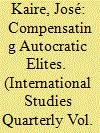

|
|
|
|
|
| Summary/Abstract |
How does international pressure for economic liberalization affect repression in autocracies? I argue that demands for deregulation create a “compensation dynamic” that can lead to repression. Autocrats can liberalize to build goodwill with the international community, but liberalization also threatens the interests of domestic autocratic elites. Liberalization undercuts the networks of patronage and clientelism that empower elites. Thus, liberalizing the economy could weaken political insiders, potentially destabilizing the regime coalition. Insider elites look to counteract this threat by demanding that autocratic rulers commit to protecting the status quo. Dictators are likely to accede and increase repression to placate allies and avoid a potential coup. Crucially, this compensation dynamic only occurs when dictators see rebellion as a potential danger to their tenure. When elites are unable to coordinate a credible threat, dictators can heed international interests without having to compensate regime insiders. In contrast, statistical analyses of a global sample of autocracies show that economic liberalization is associated with repression when elites are strong enough to check dictators’ power.
|
|
|
|
|
|
|
|
|
|
|
|
|
|
|
|
| 4 |
ID:
167424
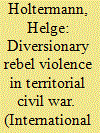

|
|
|
|
|
| Summary/Abstract |
Much of the violence carried out by rebels seeking secession or territorial autonomy occurs within the area under dispute. Still, territory-seeking rebels sometimes attack civilians in other parts of the country. By developing a diversionary theory of violence, this article helps explain why and when they do so. Rebels in territorial disputes aim to keep the government's forces out of their claimed homeland. Attacking civilians outside of the disputed area may help achieve this aim because it pushes the government to disperse its forces and commit resources to protection. Incentives for such diversionary violence are likely to prove particularly high during military offensives, when the government seeks to concentrate its forces in the contested area. I first assess the theory through a quantitative analysis of territorial conflicts worldwide between 1989 and 2015. Second, I conduct a case study of the Sri Lankan Eelam Wars, combining process-tracing and a quantitative test using new events data. I find that rebels do tend to escalate violence outside their claimed territory during government offensives and that diversion is an important causal mechanism.
|
|
|
|
|
|
|
|
|
|
|
|
|
|
|
|
| 5 |
ID:
167434


|
|
|
|
|
| Summary/Abstract |
Why do citizens support violations of their own rights? We know a good deal about why governments sometimes restrict access to information and political participation through censorship, repression, or forced disappearances. But we know little about why citizens sometimes support these government encroachments on their own freedoms. We test one conventional explanation for this phenomenon—that individuals trade freedom for security—by conducting a survey experiment that examines public support for limits on freedom of speech. Our results suggest that external threats do, in fact, increase the willingness of citizens to accept curtailments of their right to free speech. They provide strong evidence that citizens respond to risk with an increased desire for security, even when that security comes at the expense of their individual freedoms. This finding suggests a research agenda examining the interactions between governance and threat perception, including how states manipulate demand for human rights in practice, how citizens evaluate threats to security in the context of conflicting information, and how fluctuating demand for rights influences the dissent-repression nexus.
|
|
|
|
|
|
|
|
|
|
|
|
|
|
|
|
| 6 |
ID:
167426
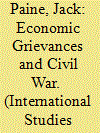

|
|
|
|
|
| Summary/Abstract |
A large body of scholarship suggests that economic grievances play an important role in civil wars. But what specific economic activities trigger such grievances, and why would governments not take proactive steps to limit economic grievances in order to stabilize their regimes? This article argues that specific economic activities—those that undermine a producer’s ability to exit the formal economy—cause governments to make taxation decisions that, despite the costliness of fighting, increase the likelihood of civil war. An inability for producers to exit the formal economy also undermines regional autonomy deals by encouraging governments to grab short-term rents despite the risk of triggering civil war. After deriving this “redistributive grievance” mechanism by analyzing an infinite-horizon bargaining model with endogenous labor supply and economic production, I address a specific empirical source of such redistributive grievances: oil-rich regions fight separatist civil wars relatively frequently. Capital-intense, geographically concentrated, and immobile oil production corresponds with conditions in the formal model that predict redistributive grievances and war. Moreover, I argue that applying the redistributive grievances mechanism to understanding the oil-separatism relationship also highlights shortcomings of alternative “greed”-based explanations.
|
|
|
|
|
|
|
|
|
|
|
|
|
|
|
|
| 7 |
ID:
167435


|
|
|
|
|
| Summary/Abstract |
Oil wealth tends to impede democracy, but scholars disagree about both why and under what conditions. This note helps answer these questions by evaluating the field's foundational theory of the rentier state, which claims that oil wealth finances generous societal benefits that reduce citizens’ demands for representation and hinder the emergence of democratic regimes. I create a new measure of such benefits, focusing specifically on the size of domestic gasoline subsidies in dollars per capita. I then use a global sample from 1990 through 2014 to demonstrate that greater spending on these subsidies significantly reduces the likelihood of a transition toward democracy. The impact on democratization is as consequential in practical terms as are large increases in the rate of economic growth. Moreover, including the measure of fuel subsidies helps account for the autocratic effect of oil income. I conclude by highlighting how this fuel subsidy data can shed light on a number of other political economy questions.
|
|
|
|
|
|
|
|
|
|
|
|
|
|
|
|
| 8 |
ID:
167440
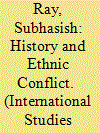

|
|
|
|
|
| Summary/Abstract |
How does the trajectory of precolonial political institutions affect contemporary ethnic conflict? I argue that ethnic groups that were governed by centralized political institutions in the precolonial period are more likely to be associated with armed conflict in the present, but that colonial state-building strategies mediate this relationship. Ethnic groups that experienced precolonial centralization were likely to be underrecruited to the top ranks of colonial security forces prior to independence. This, in turn, increased the chances that those groups would be excluded from the first postindependence regime and hence become involved in armed conflict against the state in the long run. Conversely, colonial security forces tended to overrecruit ethnic groups that did not experience precolonial centralization. This made those groups more likely to become part of the first postindependence regime and less likely to enter into armed conflict against the state in the long run. I provide robust evidence for this pathway by using a self-collected dataset on ethnic groups in ex-British colonies. The findings underscore how contemporary ethnic conflict is embedded in longer-term historical state-building processes in hitherto unappreciated ways.
|
|
|
|
|
|
|
|
|
|
|
|
|
|
|
|
| 9 |
ID:
167429


|
|
|
|
|
| Summary/Abstract |
At a time when many states are increasing restrictions on immigration, others are using formal agreements on international economic migration to open their borders. The use of international agreements on migration presents a puzzle, as most states can open their borders to migrants unilaterally. I argue that, when states cannot generate large enough flows of migrants or the right type of migrants to fill open positions in the labor market, they turn to the sending state to help them. States that need migrants can negotiate a bilateral labor agreement with a sending state, which then acts as a recruiter, helping to channel labor to the receiving state. This article details the conditions under which immigrant-receiving countries use these treaties and tests the implications of the argument on a new dataset on migration treaties.
|
|
|
|
|
|
|
|
|
|
|
|
|
|
|
|
| 10 |
ID:
167432
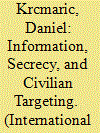

|
|
|
|
|
| Summary/Abstract |
Why do some states target civilians with violence whereas others exercise restraint? I argue regimes are more likely to victimize civilians when they believe that they can hide their actions and thereby avoid international and domestic blowback. This means that governments will prove less likely to commit atrocities in situations where information and communication technologies (ICTs) make secrecy and plausible deniability difficult. Statistical analyses provide strong support for this claim. The findings shed light on how ICTs shape violence and how states strategically employ secrecy.
|
|
|
|
|
|
|
|
|
|
|
|
|
|
|
|
| 11 |
ID:
167430


|
|
|
|
|
| Summary/Abstract |
Recent scholarship presents conflicting views on the ability of grassroots movements to resist neoliberal globalization. This article moves beyond this broad debate. It explores the specific challenges and opportunities faced by networks of the marginalized, and their allies, as they attempt to transform neoliberal global governance. The Global Alliance of Waste Pickers, a transnational advocacy network of informal recyclers and their allies, sought to influence the practices of the Clean Development Mechanism between 2009 and 2015. I assess their efforts via a “historical dialectic” framework that bridges neo-Gramscian theory with liberal constructivist scholarship. It differentiates between more and less “embedded” networks, categorizes distinct forms of policy change, and helps us to understand the factors that contribute to more or less transformative policy gains. I identify four distinct forms of policy: transformative, concessional, problem-solving, and maintenance. I argue that the network gained mostly concessional, rather than transformative, changes. My analysis suggests that concessional gains are likely in contexts in which embedded advocacy networks effectively combine discursive and institutional forms of leverage but fail to mobilize political leverage in the form of a powerful “counterhegemonic bloc.”
|
|
|
|
|
|
|
|
|
|
|
|
|
|
|
|
| 12 |
ID:
167427
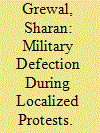

|
|
|
|
|
| Summary/Abstract |
In May 2017, the Tunisian military allowed protesters to storm and shut down an oil valve in Tataouine, in contravention of a direct order from President Essebsi to defend the production site. While scholars have recently examined military defection during mass uprisings, these protests were small and localized. Why did the military disobey President Essebsi in Tataouine? Drawing upon a survey of military officers conducted six months prior to the defection, I show that the military's composition and corporate interests, rather than its professionalism, likely prompted its defection. The majority of the military hails from impoverished regions in Tunisia's neglected interior and identifies with the demands of protesters in these regions. The military also saw the curtailment of its material and political interests in early 2017, giving it little incentive to repress protesters on the regime's behalf. Methodologically, this study provides some of the first survey data of military officers’ attitudes toward defection.
|
|
|
|
|
|
|
|
|
|
|
|
|
|
|
|
| 13 |
ID:
167425


|
|
|
|
|
| Summary/Abstract |
Personnel management at the top of terrorist groups presents a puzzle. Commanders act off-message reasonably often, sometimes angering powerful backers. When this happens group leaders typically have the means and incentives to kill the commander. Yet, we often observe group leaders dismissing them instead. This gives those commanders an opportunity to work against the movement by providing aid to the government or starting a competing group. Why would rational leaders act this way? We argue formally that this is a consequence of having to satisfy two “masters,” a common problem in organizational behavior but as of yet underexplored in the study of terrorist organizations. Our model elucidates the substantive factors that underlie a leader's fraught personnel decision when caught in such a bind, here conceptualized as between backers and an important constituency. We develop implications for organizational functioning and structure, government action against groups, and the effect of technological innovations on leaders’ incentives.
|
|
|
|
|
|
|
|
|
|
|
|
|
|
|
|
| 14 |
ID:
167436


|
|
|
|
|
| Summary/Abstract |
Contemporary United Nations (UN) peacekeeping deployments commonly pursue both security and economic objectives, but the existing scholarly literature contains hardly any systematic assessments of peacekeeping missions’ economic effects. We address this issue in two ways. First, we use cross-country data to show that UN peacekeeping missions are large-scale economic interventions. They stimulate demand in depressed economic environments; we find significantly higher economic growth in the presence of peacekeeping deployments than in comparable cases without them. However, we estimate that economic growth rapidly declines when missions end, which suggests that they do not necessarily promote stable economic development. Second, we provide evidence in this vein by turning to microlevel survey data that we collected in Monrovia, where the United Nations Mission in Liberia (UNMIL) had a large presence from 2003 onward. Our data suggests that UNMIL's spending created demand for low-skill employment in the service sector, largely without facilitating skill transfers or loosening credit constraints for business owners. This illustrates the problem of “peacekeeping economies” suggested by our cross-country analysis: peacekeeping missions help create an economic boom fueled by demand in nontraded products, particularly low-skill services, which may not be robust to the mission's withdrawal.
|
|
|
|
|
|
|
|
|
|
|
|
|
|
|
|
| 15 |
ID:
167431


|
|
|
|
|
| Summary/Abstract |
In the 1950s, the United States and Soviet Union abandoned secrecy and began sharing nuclear technology internationally. Soon thereafter, the two superpowers worked together to create the International Atomic Energy Agency (IAEA) to place safeguards on nuclear assistance and eventually added other nonproliferation measures. What explains these decisions? We argue that an international hierarchy framework offers a robust explanation for the superpowers’ behavior. We identify three distinct mechanisms through which rival hierarchies can influence the internal workings of one another: competitive shaming, outbidding, and interhierarchy cooperation. We then probe the plausibility of our argument by investigating multiple observable implications in our case study of nuclear politics. We show that Soviet competitive shaming motivated the United States’ Atoms for Peace program, which sought to strengthen the loyalty of client states or attract new ones. In response, the Soviet Union attempted to outbid the United States with its own technology-sharing program. Ultimately, Moscow and Washington cooperated on the IAEA to limit the risks that nuclear sharing posed to their own dominant positions vis-à-vis subordinate states.
|
|
|
|
|
|
|
|
|
|
|
|
|
|
|
|
| 16 |
ID:
167437


|
|
|
|
|
| Summary/Abstract |
Governments use tariffs to manage the politics of international economic integration. To navigate competing demands on trade policy, governments can target tariff rates to individual products. But existing theories miss an important aspect of tariffs: they also need to be enforced at border crossings, which for some governments creates substantial challenges. Faced with high tariffs, firms can misclassify their products into categories with lower tariff rates. Pointing to the potential for such tariff evasion, I discuss the difficulties for governments in targeting tariffs for political gain, and I derive implications for trade politics. Constraints on the ability of governments to enforce tariffs, in the form of low bureaucratic capacity, emerge as an institutional determinant of trade policy, discouraging the use of product-specific tariff rates. Disaggregated tariff data provide empirical evidence for this argument. The article identifies an institutional constraint on trade politics, contributes to growing literatures on firm heterogeneity and on illicit cross-border economic activity, and speaks to debates on trade policy and government revenue.
|
|
|
|
|
|
|
|
|
|
|
|
|
|
|
|
| 17 |
ID:
167433
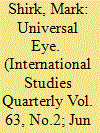

|
|
|
|
|
| Summary/Abstract |
Recent controversies over bulk data collection remind us of the importance of surveillance as a site of citizen-state interaction. Surveillance is intimately linked to the nature and scope of the state, but receives comparatively little attention in traditional work on state formation. I show that the modern surveillance state emerged as a reaction to anarchist “propaganda of the deed,” which entailed assassinations of political leaders, as well as bombings of cafes, theatres, and landmarks. I theorize this mutation through a practice conception of state institutions, one that focuses on processes of boundary maintenance and transformation. I argue that boundary “shattering” constitutes an important mechanism of state transformation, one in which events or processes render existing boundary-drawing practices useless. The ensuing crisis requires the state to “reinscribe” new boundaries through the development of new practices.
|
|
|
|
|
|
|
|
|
|
|
|
|
|
|
|
| 18 |
ID:
167439
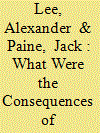

|
|
|
|
|
| Summary/Abstract |
Extensive research suggests that European rule negatively affected political and economic development in their colonies. But did outcomes improve after colonial rule ended? Studying post–World War II independence cases, we statistically examine consequences of postwar decolonization—which includes both colonial autonomy and independence—for democracy, internal conflict, government revenue growth, and economic growth using two-way fixed-effects models. We find that democracy levels increased sharply as colonies gained internal autonomy in the period immediately before their independence. However, conflict, revenue growth, and economic growth did not systematically differ before and after independence. Accounting for varieties of colonial institutions or for endogenous independence timing produces similar results. Except for democratic gains, the overall findings—juxtaposed with existing research—suggest that, although European colonial empires created deleterious long-term effects, decolonization exhibited less pronounced political consequences than sometimes thought.
|
|
|
|
|
|
|
|
|
|
|
|
|
|
|
|
|
|
|
|
|